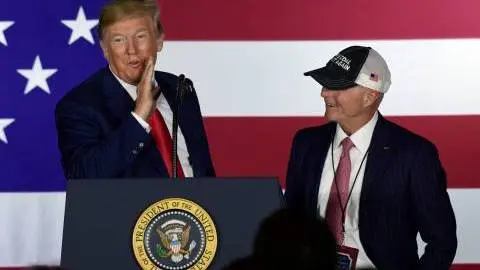The moment when America fell behind
The European Union and China, in particular, are focusing on long-term investments in clean energy, whereas America is doubling down on the past, writes Jules Kortenhorst for Project Syndicate
The US is at risk of being left behind
As governments around the world adopt policies to address the immediate economic fallout of Covid-19, they are making decisions that will also determine their countries’ competitiveness for decades to come. If designed correctly, stimulus and recovery packages can position countries and regions to reap the benefits of the industries of the future.
The European Union is already poised to speed ahead with the European Green Deal. And China will inevitably build on its pre-pandemic competitive advantages in solar power, electric vehicles (EVs), and batteries. The United States, on the other hand, is increasingly at risk of being left behind.
The European Green Deal is the perfect model for designing stimulus and recovery packages to create both immediate and long-term economic advantages. In the short run, its proposed investments would produce many high-paying jobs in clean-energy infrastructure, funding the installation of more wind and solar facilities, EV charging stations, hydrogen production plants, and programs to retrofit buildings for energy efficiency.
Better still, over the long term, all of these investments will result in lower energy costs, more resilient energy systems, and a healthier population – among many other benefits. The costs of clean-energy technologies have been falling rapidly, following predictable learning curves. Over time, they will only become cheaper and faster to deploy on a greater scale.
The EU Green Deal earmarked €40 billion investment in hydrogen infrastructure
Recognizing these advantages, Europe’s recovery efforts have already allocated billions of euros to build solar farms in Iberia and offshore wind turbines in the North Sea. European companies such as Vestas, Siemens Gamesa, and others will do all the work. And these expanded sources of cheap, renewable electricity will then be used to produce the hydrogen molecules that will power heavy industry in the future. By earmarking €40 billion ($45 billion) for investment in hydrogen infrastructure, the European Green Deal aims to ensure that shipping, steel manufacturing, and other industries can run on clean fuel.
The EU has also set aside recovery funds to install two million electric and hydrogen vehicle charging stations, thereby stimulating demand for EVs that can be built locally by companies like Volkswagen, Mercedes, and Renault. In these and other ways, Europe is taking meaningful steps to catch up with China in green technologies.
In the US, policymakers have thought little about the future
Then again, if China were to introduce a stimulus and recovery package modelled after the European Green Deal, it could extend its competitive advantage into other forms of renewable energy, electric mobility, and hydrogen-powered industry. As in Europe, investment in green infrastructure will produce millions of good jobs in the near term, while reducing or containing air pollution and greenhouse-gas emissions over the long term, even as the Chinese economy grows. The clean air, quiet streets, and pristine views that became an accidental byproduct of the pandemic lockdown can be made permanent with cleaner forms of energy and transportation.
In the US, by contrast, though the federal government has taken some of the necessary steps to mitigate the short-term collapse of the economy, policymakers have thought little about the future. That is why many of the dirty industries of the past are being bailed out.
Concerted policies to build clean-energy infrastructure will boost prosperity
A decade ago, the conventional wisdom was that America would lead the energy future because it was approaching “energy independence,” owing to massive reserves of shale oil and gas that could now be extracted through hydraulic fracturing (fracking). But those industries are now in structural decline. The cost curves are clear: fossil fuels cannot compete with cheaper, more efficient, and clean-energy solutions. By the same token, EVs will become steadily cheaper and more reliable than internal combustion engines, just as green hydrogen will become the energy of choice for increasingly decarbonized heavy industries.
Watching US President Donald Trump’s administration attempt to rescue jobs in coal mining, I am reminded of my first job after high school, when I worked in a typewriter factory in the south of the Netherlands. Imagine if the Dutch government had for some reason decided to bail out that factory when personal computers started coming to market in the 1980s and 1990s. It would have been investing in a museum, not in a viable industry.
While jobs in the fossil-fuel industry will be lost, many more jobs will be created to manufacture wind turbines and batteries, install solar panels, build EVs, retrofit buildings, and so forth. The world is making the transition to clean energy, and those countries that are betting on the technologies of the past are digging their own economic graves.
Concerted industrial policies to build clean-energy infrastructure will do an enormous amount of good, not just for people and the planet, but also for countries’ economic competitiveness and future prosperity. Europe and China understand this and are already on track to become the leaders of the world economy in the coming decades. They are actively leveraging their recovery packages to hasten that historic shift. In Europe, especially, future generations will admire today’s leaders for creating jobs, driving down air pollution, and establishing a competitive economic position for decades to come. In the US, not so much.
The original article first appeared on Project Syndicate here on 10th June 2020.
This publication has been prepared by ING solely for information purposes irrespective of a particular user's means, financial situation or investment objectives. The information does not constitute investment recommendation, and nor is it investment, legal or tax advice or an offer or solicitation to purchase or sell any financial instrument. Read more
Download
Download opinion
26 June 2020
New Horizons Hub: Will banking survive covid-19? This bundle contains 4 Articles